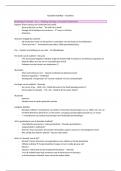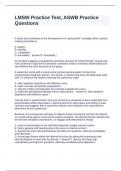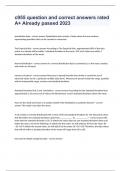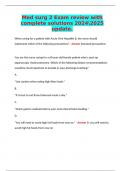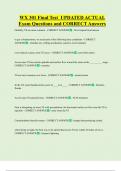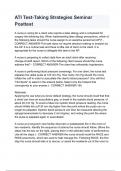WEEK 1 – Lecture 1 (college 1)
Biases in business decisions: when executives make business
decisions (even important strategic ones), their thought process does not
remotely resemble the rational, thoughtful, analytical approach described
in business textbooks.
Humans are not perfect decision makers. Not only are we not perfect, but
we depart from perfection or rationality in systematic and predictable
ways. The understanding of these systematic and predictable departures
is core to the field of judgement and decision making. By understanding
these limitations, we can also identify strategies for making better and
more effective decisions.
WEEK 1 – Lecture 2 (college 2)
Rational decision making process:
- Define the problem
- Identify the decision criteria
- Weight the identified decision making criteria
- Generate possible alternatives
- Rate each alternative against decision maker’s criteria
Assumptions:
- Assumes the decision maker is rational
- Assumes the problem maker is clear and unambiguous
- Assumes the decision maker has complete information
- No time or cost constraints
- Choice will be one with the maximum payoff
Expected utility theory: axioms (aanvaarde bewering)
Dominance principle: alternative gambles can be ranked from
best to worst in terms of expected value.
Cancellation: a choice between gambles should depend only on
those outcomes that differ.
Transitivity: if you prefer A>B and B>C, then you must prefer A>C.
Invariance: preference should remain invariant or stable, no matter
how choices are described.
Expected utility theory assumes description invariance = different
formulations of the same choice problem should give rise to the same
preference order.
However, framing effects lead to violation of the invariance and the
dominance axioms of expected utility theory.
,Loss aversion = the disutility (displeasure/pain) associated with a loss of
a given amount is higher than the utility associated with a gain of the
same magnitude.
Normative models prescribe how people “ought” to make decisions in a
perfectly rational way. (expected utility theory)
Descriptive models describe how people actually make decisions.
(prospect theory provides better description of choice under risk and
uncertainty.)
Gains – Risk averse
Losses – Risk seeking
We place a high overall value on the creation of certainty.
Prospect theory = explains how people make decisions under risk and
uncertainty, showing that individuals do not always act rationally when
evaluating potential gains and losses. (Daniel Kahneman and Amos
Tversky)
- Certainty effect = tendency for people to overvalue outcomes that
are certain, compared to outcomes that are merely probable, even
when the probable outcome has a higher expected value.
- Pseudocertainty effect = the tendency for people to perceive an
outcome as certain while it is actually uncertain.
Status Quo = the existing stage. People often resist change and prefer
the status quo. (even if we didn’t originally choose it)
, WEEK 2 – Lecture 1 (college 3)
Richard H. Thaler:
- Mental accounting
- Self-Control
- Fairness
- Behavioral Finance
Endowment effect = the tendency for people to value something more
simply because they own it. This bias leads to overvaluing personal
possessions.
Mental Accounting:
a concept introduced by Richard Thaler, describes how people categorize,
evaluate, and manage their money in separate "mental accounts," often
leading to irrational financial decisions. Instead of treating money as
fungible (completely interchangeable), people assign it different value
based on subjective criteria, such as its source or intended use.
Hedonic editing = people tend to integrate losses and segregate gains
[restructuring gains and losses in a way that maximizes pleasure and
minimizes losses].
Hedonic mental accounting involves categorizing experiences based
on their emotional value, leading to decisions influenced by pleasure and
pain rather than just monetary costs.
Framing outcomes: minimal – typical – comprehensive
1. Minimal account = people focus solely on the differences between
two options ignoring other features.
2. Typical account = people connect the consequences of potential
choices to a reference level determined by the context of the decision,
allowing for more nuanced decision-making based on relative gains or
losses.
3. Comprehensive account = people take into consideration all factors
influencing a decision, including current wealth, future earnings, and
possible outcomes from other probabilistic options, leading to more
informed and rational choices.
Biases in business decisions: when executives make business
decisions (even important strategic ones), their thought process does not
remotely resemble the rational, thoughtful, analytical approach described
in business textbooks.
Humans are not perfect decision makers. Not only are we not perfect, but
we depart from perfection or rationality in systematic and predictable
ways. The understanding of these systematic and predictable departures
is core to the field of judgement and decision making. By understanding
these limitations, we can also identify strategies for making better and
more effective decisions.
WEEK 1 – Lecture 2 (college 2)
Rational decision making process:
- Define the problem
- Identify the decision criteria
- Weight the identified decision making criteria
- Generate possible alternatives
- Rate each alternative against decision maker’s criteria
Assumptions:
- Assumes the decision maker is rational
- Assumes the problem maker is clear and unambiguous
- Assumes the decision maker has complete information
- No time or cost constraints
- Choice will be one with the maximum payoff
Expected utility theory: axioms (aanvaarde bewering)
Dominance principle: alternative gambles can be ranked from
best to worst in terms of expected value.
Cancellation: a choice between gambles should depend only on
those outcomes that differ.
Transitivity: if you prefer A>B and B>C, then you must prefer A>C.
Invariance: preference should remain invariant or stable, no matter
how choices are described.
Expected utility theory assumes description invariance = different
formulations of the same choice problem should give rise to the same
preference order.
However, framing effects lead to violation of the invariance and the
dominance axioms of expected utility theory.
,Loss aversion = the disutility (displeasure/pain) associated with a loss of
a given amount is higher than the utility associated with a gain of the
same magnitude.
Normative models prescribe how people “ought” to make decisions in a
perfectly rational way. (expected utility theory)
Descriptive models describe how people actually make decisions.
(prospect theory provides better description of choice under risk and
uncertainty.)
Gains – Risk averse
Losses – Risk seeking
We place a high overall value on the creation of certainty.
Prospect theory = explains how people make decisions under risk and
uncertainty, showing that individuals do not always act rationally when
evaluating potential gains and losses. (Daniel Kahneman and Amos
Tversky)
- Certainty effect = tendency for people to overvalue outcomes that
are certain, compared to outcomes that are merely probable, even
when the probable outcome has a higher expected value.
- Pseudocertainty effect = the tendency for people to perceive an
outcome as certain while it is actually uncertain.
Status Quo = the existing stage. People often resist change and prefer
the status quo. (even if we didn’t originally choose it)
, WEEK 2 – Lecture 1 (college 3)
Richard H. Thaler:
- Mental accounting
- Self-Control
- Fairness
- Behavioral Finance
Endowment effect = the tendency for people to value something more
simply because they own it. This bias leads to overvaluing personal
possessions.
Mental Accounting:
a concept introduced by Richard Thaler, describes how people categorize,
evaluate, and manage their money in separate "mental accounts," often
leading to irrational financial decisions. Instead of treating money as
fungible (completely interchangeable), people assign it different value
based on subjective criteria, such as its source or intended use.
Hedonic editing = people tend to integrate losses and segregate gains
[restructuring gains and losses in a way that maximizes pleasure and
minimizes losses].
Hedonic mental accounting involves categorizing experiences based
on their emotional value, leading to decisions influenced by pleasure and
pain rather than just monetary costs.
Framing outcomes: minimal – typical – comprehensive
1. Minimal account = people focus solely on the differences between
two options ignoring other features.
2. Typical account = people connect the consequences of potential
choices to a reference level determined by the context of the decision,
allowing for more nuanced decision-making based on relative gains or
losses.
3. Comprehensive account = people take into consideration all factors
influencing a decision, including current wealth, future earnings, and
possible outcomes from other probabilistic options, leading to more
informed and rational choices.

